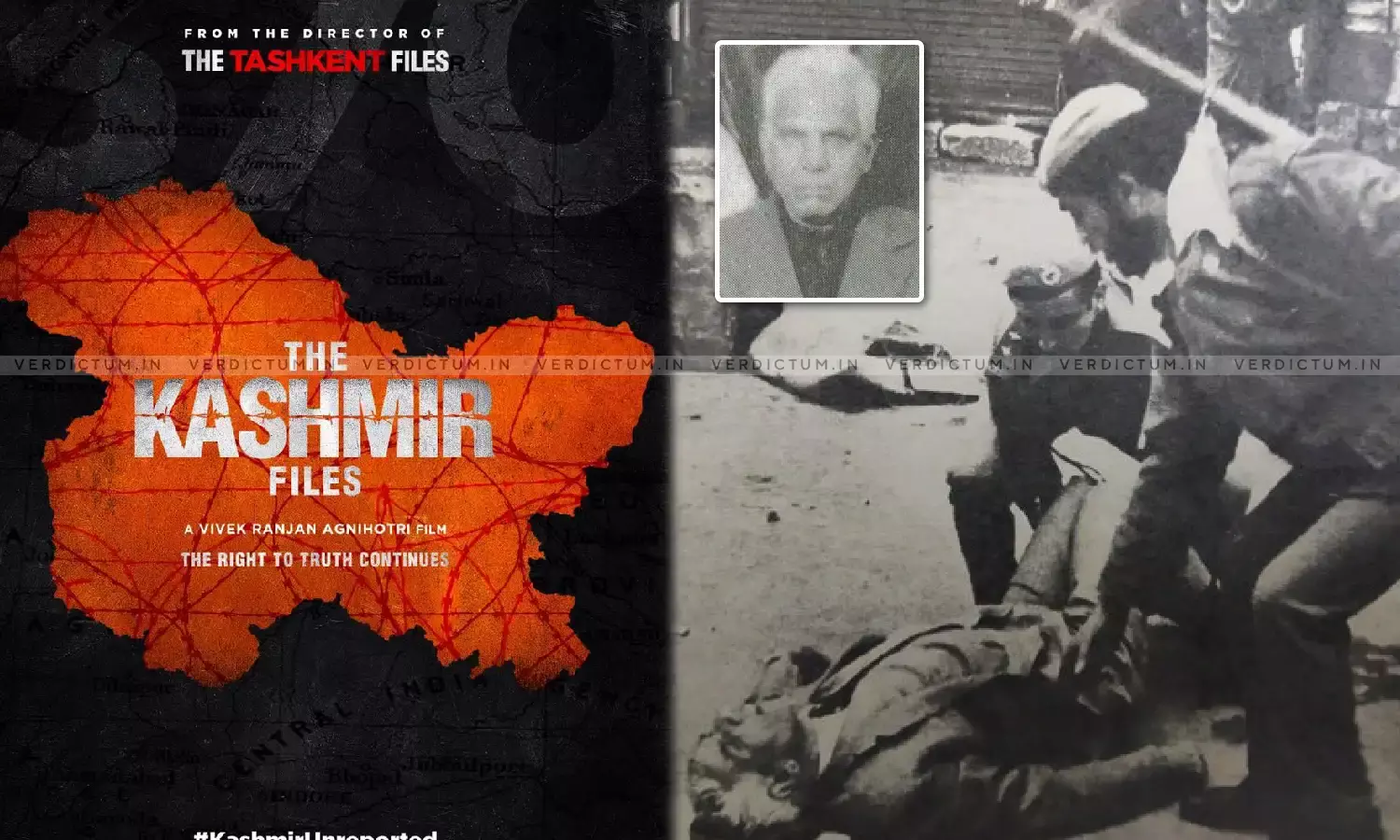The Kashmir Files: Public Execution Of A Judge And Glorification Of His Killers

The recently released movie about atrocities committed against Kashmiri Pandits in the valley, The Kashmir Files, refers to the murder of a judge in the early days of the organised attack on the minority Pandit community in the state.
Neelkanth Ganjoo, a retired Sessions and District Judge, was shot dead on 4 November 1989 by Islamic terrorists in Srinagar.
He was killed in broad daylight by three terrorists at the Hari Singh Street market, which is very close to the High Court building. He was shot from close range, and he died on the spot.
Conviction of Maqbool Bhat
Maqbool Bhat was the founder of the National Liberation Front. In September, 1966 he and his group kidnapped Amar Chand, a CID Police Inspector and shot him dead. Later, Bhat was captured by police in an encounter.
Maqbool Bhat was tried and sentenced to death in August, 1968 for the murder of Police Inspector Amar Chand by the then Sessions Judge, Neelkanth Ganjoo. The conviction and sentence awarded by Neelkanth Ganjoo were ultimately upheld by the Supreme Court in the year 1982.
However, Bhat escaped from prison in December, 1968 and was captured again in May, 1976 while robbing a bank and killing its manager. He was tried and convicted for the said offence and awarded a second death sentence. He was hanged to death in February, 1984 and his body buried inside the Tihar jail.
Yasin Malik's Interview to BBC
In 2002, Yasin Malik gave an interview to BBC. Tim Sebastian, the host of the program 'Hard Talk' asked Malik, "You never killed the judge who tried and passed the death sentence against the JKLF leader Maqbool Bhat?"
"Yes", answers Malik. "You did?" asks the interviewer.
"I did not did it but it is a fact that JKLF killed the judge. But, what was the crime of Muhammad Maqbool Bhat? ....Because the judge passed a politically motivated judgment against a great leader of Kashmir, who was a political leader."
That's your assessment, says the interviewer. "It is not my assessment, it is a fact", says Malik.
The interviewer says that India does not accept it as a fact.
"If India does not accept it, they have their own judges... Kashmir judiciary is not functioning properly, it is under the influence of ... (not clear) and the judge gave a politically motivated judgment against a great leader... he was deserving such treatment in reciprocation (not clear)", says Malik.
Status of the case
In 2019, the grandson of Judge Neelkanth Ganjoo appeared on a television news debate and called for a quick trial of Yasin Malik. "Who can forget that this nation had to undergo the shameful spectacle of this killer being hugged by the previous Prime Minister Dr Manmohan Singh?", said Anmol.
Not only that no one has been punished for the murder of the judge, but the person who almost admitted to killing the judge on television was given a political platform by the Prime Minister of the Country.
OpIndia has published a column (read here) on how the media and political establishment of the country went out of the way to patronise Yasin Malik.
In March, a Court in Jammu framed charges against Yasin Malik and six others for the killing of four Indian Air Force officials in 1990 in Srinagar.
JKLF, the group that killed Neelkanth Ganjoo as per Yasin Malik, was banned by the government only in March 2019, after the Pulwama attack.
Afzal Guru, JNU and Yasin Malik
"Afzal Hum Sharminda Hai, Tere Kaatil Zinda Hai", was the slogan raised by students in the JNU in 2016 in support of Afzal Guru, the Islamic terrorist who was sentenced to death for his role in the attack on the Indian Parliament.
The sentiments expressed in the JNU for the judges who sentenced Afzal Guru to death were similar to what Yasin Malik had to say about the killing of Judge Neelkanth Ganjoo.
Yasin Malik continues to be eulogized by a section of Indian polity, the same section that continues to justify the slogan "Tere Kaatil Zinda Hai" as a cry against 'fascism'.
After the murder of a Judge in Dhanbad last year, the Supreme Court of India took suo moto cognizance of the matter, even though the Jharkhand High Court had already taken suo moto cognizance. The Chief Justice of India N V Ramana had remarked that the murder has 'wider ramifications', including on the 'independence of judiciary'.
The Supreme Court of India has at least twice declined to entertain petitions seeking probe into the atrocities committed in Kashmir against Pandits, the last being in the year 2017, saying, "no fruitful purpose would emerge" from the exercise.
The family of Judge Neelkanth Ganjoo continues to await justice.
[The opinions expressed in this article are those of the author. Verdictum does not assume any responsibility or liability for the contents of the article.]

